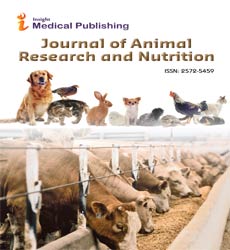Dietary Requirements for Different Animal Species
Akiyoshi Pucker*
Department of Veterinary and Animal Sciences, University of Chile, Chile
Akiyoshi Pucker*
Department of Veterinary and Animal Sciences, University of Chile, Santiago, Chile
- *Corresponding Author:
- Akiyoshi Pucker
Department of Veterinary and Animal Sciences,
University of Chile, Santiago,
Chile,
E-mail: Pucker_a@gmail.com
Received date: November 07, 2023, Manuscript No. IPJARN-24-18421; Editor assigned date: November 10, 2023, PreQC No. IPJARN-24-18421 (PQ); Reviewed date: November 24, 2023, QC No. IPJARN-24-18421; Revised date: December 01, 2023, Manuscript No. IPJARN-24-18421 (R); Published date: December 07, 2023, DOI: 10.36648/2572-5459.8.6.102
Citation: Pucker A (2023) Dietary Requirements for Different Animal Species. J Anim Res Nutr Vol. 8 No.6: 102.
Description
Animal nutrition is a multidisciplinary science that delves into the dietary needs of various animal species, encompassing everything from livestock and pets to wildlife. The study of animal nutrition plays a crucial role in ensuring the health, growth, reproduction, and overall well-being of animals. Proper nutrition is essential for animals to thrive, and understanding their nutritional requirements is fundamental for those involved in animal care, agriculture, and conservation. Animals, like humans, require macronutrients in their diets for energy and growth. These include carbohydrates, proteins, and fats. Carbohydrates serve as the primary energy source, while proteins are crucial for muscle development and repair. Fats are essential for energy storage and play a role in the absorption of fat-soluble vitamins.
Micronutrients, such as vitamins and minerals, are required in smaller quantities but are equally vital. They contribute to various physiological functions, including bone development, immune system support, and enzyme activation. Common micronutrients include vitamins A, B, C, D, and minerals like calcium, phosphorus, and iron
Animals with a single-chambered stomach, like humans and dogs, are monogastric. Their digestive systems are efficient in breaking down a variety of food types. Proper balance of macronutrients and micronutrients is critical for maintaining health and preventing nutritional deficiencies. Ruminants, such as cows and sheep, have a complex stomach with multiple chambers. These animals rely on microbial fermentation to break down fibrous plant materials. The symbiotic relationship between ruminants and microorganisms highlights the importance of a balanced diet to support both the animal and its gut microbiota. Proper nutrition is essential in livestock farming for optimal meat, milk, and wool production. Livestock diets are carefully formulated to meet the specific needs of each species, considering factors like age, weight, and production stage. Balanced feed formulations help prevent nutrient deficiencies and ensure efficient feed utilization.
The nutritional needs of pets, including dogs and cats, vary based on factors such as breed, size, age, and activity level. Commercial pet foods are formulated to provide a complete and balanced diet, often incorporating specific ingredients to address common health concerns, such as joint health or dental care. In the wild, animals must obtain nutrients from their natural environment. Understanding the dietary habits of wildlife is crucial for conservation efforts. Zoos and wildlife rehabilitation centers meticulously design diets that mirror the animals' natural intake, considering factors like prey availability and seasonal variations. The bioavailability of nutrients, or the degree to which they can be absorbed and utilized by the body, varies among different feed sources. Certain compounds in plants may limit the absorption of essential nutrients, emphasizing the importance of considering nutrient bioavailability in diet formulations.
Nutritional Disorders
Animals may suffer from various nutritional disorders, including deficiencies and excesses. Common disorders include rickets (vitamin D deficiency), scurvy (vitamin C deficiency), and metabolic disorders resulting from imbalances in nutrient intake. Understanding these disorders is crucial for preventing and treating nutritional issues in animals. Genetic engineering has enabled the development of crops with enhanced nutritional profiles. For example, certain Genetically Modified Organisms (GMOs) aim to increase the nutrient content of animal feed, providing a more efficient means of meeting nutritional requirements and improving animal health. Advances in technology allow for more precise formulations of animal diets. Precision nutrition involves tailoring diets based on individual animals' needs, optimizing nutrient intake and minimizing waste. This approach is particularly relevant in large-scale animal production systems.
Environmental Impact of Animal Nutrition
The environmental impact of animal agriculture has led to increased interest in sustainable feeding practices. Researchers are exploring alternative protein sources, such as insect protein and plant-based diets, to reduce the reliance on traditional feed ingredients that may contribute to deforestation and overfishing. Livestock waste, particularly in concentrated animal feeding operations, poses environmental challenges. Proper nutrition plays a role in minimizing nutrient excretion, which, in turn, reduces the environmental impact of animal agriculture. As our understanding of animal genetics advances, personalized nutrition for animals may become more commonplace. Tailoring diets based on an individual animal's genetic makeup could enhance health and performance. The integration of technology, such as sensors and data analytics, can provide real-time insights into animal nutrition. This allows for immediate adjustments to diets, ensuring animals receive optimal nutrition throughout their lives.
In conclusion, animal nutrition is a complex and dynamic field that intersects with various disciplines, including biology, chemistry, and environmental science. Understanding the nutritional needs of different animal species is essential for promoting animal health, welfare, and productivity. Ongoing research and technological advancements continue to shape the future of animal nutrition, with a focus on sustainability, precision, and individualized care. By addressing the diverse dietary requirements of animals, we contribute not only to their well-being but also to the overall sustainability of agriculture and conservation efforts.

Open Access Journals
- Aquaculture & Veterinary Science
- Chemistry & Chemical Sciences
- Clinical Sciences
- Engineering
- General Science
- Genetics & Molecular Biology
- Health Care & Nursing
- Immunology & Microbiology
- Materials Science
- Mathematics & Physics
- Medical Sciences
- Neurology & Psychiatry
- Oncology & Cancer Science
- Pharmaceutical Sciences
